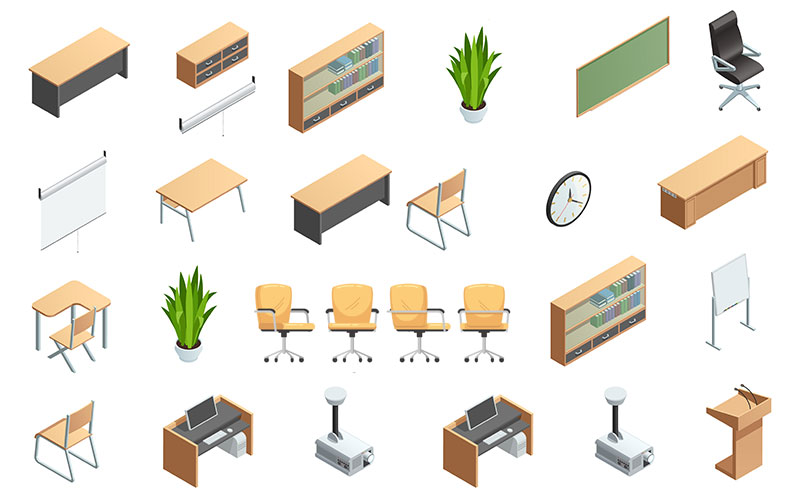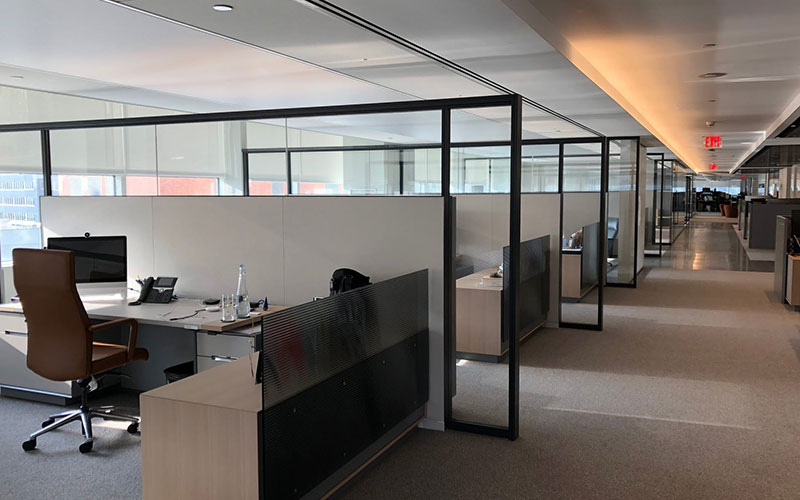
What is Furniture Management?
Furniture management is the planning and execution of the selection, procurement, delivery, and installation of the FF&E for an organization or their project. An affective consultant offering furniture management services must be free of any ties to any manufacturer, dealer, distributor, installation company or other service provider supplying the required services. A Furniture Manager must:
- Discover the client’s needs through dialogue with the project programming and management team, architectural firm, finance department, procurement department, and other stakeholders in the process.
- Assist in identifying the appropriate types of furniture suited to meet the client’s needs.
- Collaborate with stakeholders to plan furniture layouts that optimize space utilization, functionality, and aesthetics and assist in verifying proof-of-concept plans integrating real-world field conditions and construction considerations.
- Prove due diligence by vetting the appropriate vendors and suppliers of the goods and services needed to fulfill the client’s scope and schedule of work. Ensure that the qualified vendors meet the quality standards and budget constraints of the project.
- Prepare and manage the RFI, RFQ, and RFP process to ensure complete coverage of the intended scope, schedule, and budget for the project.
- Receive, level, analyze bids, and make recommendations to client as to the viability of the responses.
- Negotiate terms, conditions, and prices, on the client’s behalf.
- Award contracts, issue, and monitor the purchase orders and progress payments on the client’s behalf.
- Track and manage the orders to ensure accuracy of specification and schedule, keeping track of order acknowledgements and monitoring quantities, pricing, and timeliness of delivery dates.
- Oversee the delivery and installation sequence and schedule, coordinating site readiness with building access.
- Monitor each delivery to ensure accounting of items ordered and delivered, correct placement of products, and overall efficiency of the process.
- Maintain continual cost accounting reporting services to ensure timely payment of contractual obligations and performance.
- Manage the installation process of the client’s behalf to guarantee adherence to schedule and maintain quality standards and practices.
- Perform continual punch list maintenance to ensure minimal issues that will need to be addressed at the end of the installation.
- Provide closed-out documents reflecting the costs, payments, and scope of the project, along with any collateral materials relevant to the project, its contracts, warranties, maintenance and guidelines for re-use or liquidation.
Overall, a Furniture Manager plays a crucial role in ensuring that an organization’s furniture needs are met efficiently, cost-effectively, and in alignment with its objectives and standards.
External Links:
- What does the FF&E procurement process look like:
- A Furniture Consultant can provide the information you need for your FF&E CapEX allocation:
- A Furniture Consultant for commercial projects is similar to a purchasing agent for hospitality projects and can function the same:
Why Logistics?
Logistics is the only Furniture Consultancy firm providing Furniture Management that is independent and free from any ties with Furniture Manufacturers, Furniture Rep Firms, Furniture Dealers, or Furniture Warehousing, Distribution, or Installation Companies. We are the only company with proven experience providing comprehensive furniture management and labor oversight, ensuring continuity among all vendors, contractors, subcontractors, and stakeholders in a project. We offer comprehensive due diligence process and boots in the field real world experience to solve save our clients from the potential pitfalls and minefields that exist on every corporate relocation project.
FAQ’s
Why not just use a furniture dealer as my Furniture Manager?
Most companies marketing their services as a Furniture Manager are Furniture Dealers offering solutions to your needs by matching those needs with the product lines they represent. A deep dive into understanding how the industry currently functions will reveal that while your furniture dealer may offer some management services, there are several reasons why you might choose to engage a separate Furniture Manager:
- Expertise: Furniture dealers specialize in selling furniture, whereas Furniture Managers have expertise in overseeing all aspects of furniture within a space or organization, including procurement, space planning, installation, maintenance, and disposal. A dedicated Furniture Manager can offer, not only these services, but a broader range of services and insights beyond just purchasing furniture.
- Independence: A Furniture Manager acts independently from furniture suppliers, ensuring that they prioritize your organization’s needs and objectives rather than promoting specific products or brands. This independence helps avoid conflicts of interest and ensures unbiased decision-making.
- Comprehensive Solutions: Furniture Managers can provide end-to-end solutions for all your furniture-related needs, from initial planning and procurement to ongoing management and eventual disposal. They offer holistic support throughout the furniture lifecycle, optimizing processes and maximizing value for your organization.
- Customization: Furniture Managers tailor their services to your specific requirements, considering factors such as budget constraints, space limitations, design preferences, and functional requirements. They can provide personalized solutions that align with your organization’s unique goals and priorities.
- Efficiency and Cost Savings: By leveraging their expertise, industry connections, and negotiation skills, Furniture Managers can streamline the furniture procurement process, minimize risks, and identify cost-saving opportunities. They help ensure that you get the best value for your investment while avoiding common pitfalls and delays.
Isn’t a Furniture Manager duplicating the service of a furniture dealer?
While there may be some overlap in the services provided by a Furniture Manager and a furniture dealer, they serve distinct roles and offer different levels of expertise and support:
- Scope of Services: A furniture dealer primarily focuses on selling furniture products. They assist with selecting and purchasing furniture items from their inventory or catalog. Their services typically revolve around the transactional aspect of buying furniture. On the other hand, a Furniture Manager offers a broader range of services beyond just procurement. They oversee all aspects of furniture within a space or organization, including space planning, installation, maintenance, and disposal. Their role is more comprehensive and involves managing the entire furniture lifecycle.
- Independence and Objectivity: Furniture dealers are typically affiliated with specific brands or manufacturers and may prioritize selling products from those sources. While they can provide valuable insights and recommendations, their recommendations may be influenced by their relationships with suppliers. Furniture Managers, on the other hand, act independently and prioritize the interests of their clients. They offer unbiased advice and solutions tailored to the client’s needs, without favoring any particular brand or supplier. This independence ensures that decisions are made in the client’s best interest.
- Customization and Optimization: Furniture Managers work closely with clients to understand their unique requirements, constraints, and objectives. They provide customized solutions that optimize space utilization, functionality, aesthetics, and budget. While furniture dealers may offer some customization options, their primary focus is on selling existing products from their inventory. They may not have the expertise or flexibility to provide tailored solutions that address all aspects of the client’s needs.
While there may be some overlap in the services provided, using a Furniture Manager is not necessarily duplicating the service of a furniture dealer. Instead, it complements and enhances the furniture procurement process by providing additional expertise, independence, and comprehensive support throughout the furniture lifecycle. Additionally, a Furniture Manager provides you with the option of going direct to the manufacturer, a furniture rep company, or multiple furniture dealers to get the best product options and pricing possible.
Why would I pay a Furniture Manager if I am going to pay a furniture dealer?
Engaging a Furniture Manager and working with a furniture dealer serve different purposes and offer distinct benefits, which can justify the cost of each:
- Expertise and Specialization: Furniture Managers specialize in overseeing all aspects of furniture within a space or organization, including procurement, space planning, installation, maintenance, and disposal. They offer expertise in managing the entire furniture lifecycle and ensuring that furniture solutions align with your specific needs and objectives. Furniture dealers, on the other hand, primarily focus on selling furniture products from their inventory or catalog. While they can provide valuable insights and recommendations regarding individual furniture items, their expertise may be limited to the transactional aspect of buying furniture.
- Independence and Objectivity: Furniture Managers act independently and prioritize the interests of their clients. They offer unbiased advice and solutions tailored to the client’s needs, without favoring any particular brand or supplier. This independence ensures that decisions are made in the client’s best interest. Furniture dealers may have affiliations with specific brands or manufacturers and may prioritize selling products from those sources. While they can offer valuable products and recommendations, their advice may be influenced by their relationships with suppliers.
- Comprehensive Support and Optimization: Furniture Managers provide end-to-end solutions for all furniture-related needs, from initial planning and procurement to ongoing management and eventual disposal. They offer holistic support throughout the furniture lifecycle, optimizing processes and maximizing value for your organization.
While furniture dealers can assist with selecting and purchasing individual furniture items, their services typically revolve around the transactional aspect of buying furniture. They may not have the expertise or capacity to provide comprehensive support for all aspects of furniture management. Ultimately, while there may be some overlap in the services provided, engaging both a Furniture Manager and a furniture dealer can complement and enhance the furniture procurement process by providing additional expertise, independence, and comprehensive support tailored to your organization’s specific needs and objectives. The cost of each service reflects the value they bring and the benefits they offer in managing your furniture requirements effectively.
If I have a Furniture Manager, why do I need a furniture dealer?
Engaging a Furniture Manager and working with a furniture dealer or dealers serves different but complementary roles in managing your furniture needs. While a Furniture Manager oversees the entire furniture lifecycle and provides comprehensive support, a furniture dealer specializes in selling furniture products and can offer insights and options for specific items. Here’s why you might still need a furniture dealer even if you have a Furniture Manager:
- Product Selection: Furniture dealers offer products from various manufacturers, giving you access to the furniture lines they represent. They can help you find specific items in there catalogue of products that meet your design preferences, functional requirements, and budget constraints.
- Access to Brands and Suppliers: Furniture dealers have established relationships with furniture manufacturers and suppliers, allowing them to access exclusive products, special discounts, and customized solutions.
- Product Expertise: Furniture dealers have in-depth knowledge about the furniture products they offer, including their features, materials, construction, and specifications.
- After-Sales Support: Furniture dealers can provide after-sales support, including warranty assistance, maintenance services, and product replacements. They serve as a reliable point of contact for any issues or concerns you may encounter with your furniture purchases.
While a Furniture Manager offers valuable guidance and oversight throughout the furniture lifecycle, engaging with a furniture dealer can complement their services by providing access to a specific brand of products, expertise, and convenience in sourcing and acquiring the furniture lines they represent. Together, the Furniture Manager and the furniture dealer or dealers on your project work synergistically to ensure that your furniture needs are met effectively and efficiently.











